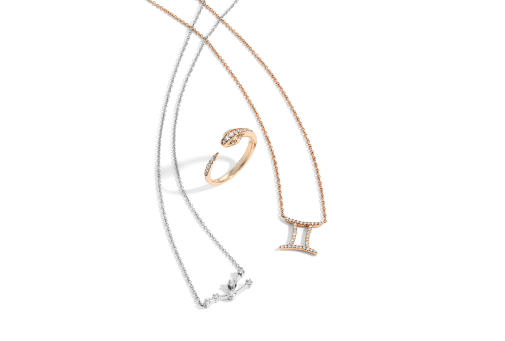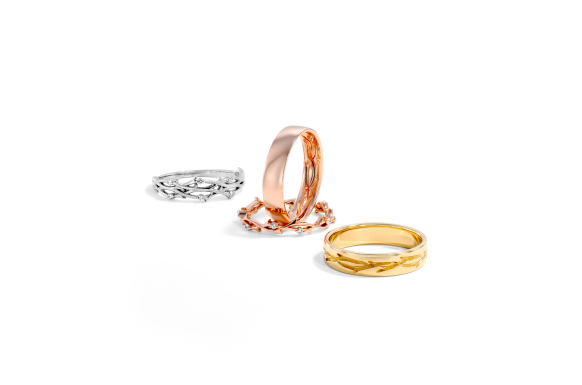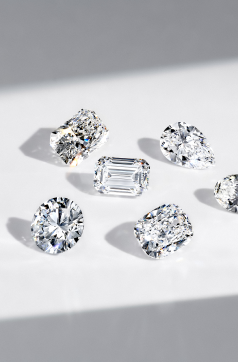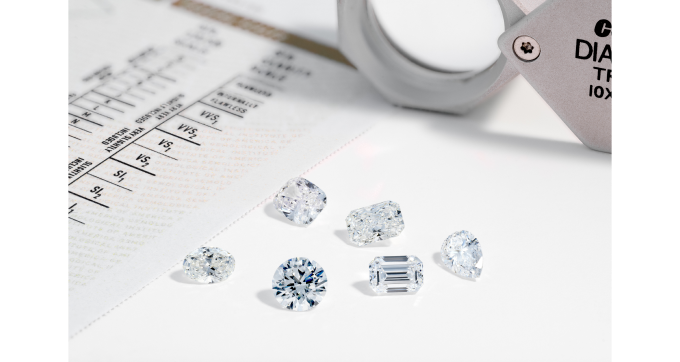Want to see how a marquise cut diamond looks on your hand at 1, 2, or more carats? You’re in the right place. We made the chart and images below to give you an idea of how big marquise cut diamonds are at different weights.
Marquise Diamond Dimensions & Sizes
|
Length |
Width |
Marquise Weight |
|
3 mm. |
1.5 mm. |
0.025 ct. |
|
3.5 mm. |
1.75 mm. |
0.065 ct. |
|
3.5 mm. |
2 mm. |
0.07 ct. |
|
4 mm. |
2 mm. |
0.10 ct. |
|
3.75 mm. |
1.75 mm. |
0.11 ct. |
|
4.25 mm. |
2.25 mm. |
0.12 ct. |
|
5 mm. |
2.5 mm. |
0.14 ct. |
|
5.5 mm. |
2.75 mm. |
0.16 ct. |
|
5.5 mm. |
3 mm. |
0.18 ct. |
|
5 mm. |
3 mm. |
0.20 ct. |
|
6.5 mm. |
3 mm. |
0.23 ct. |
|
6 mm. |
3 mm. |
0.25 ct. |
|
7 mm. |
3 mm. |
0.30 ct. |
|
7.5 mm. |
3.5 mm. |
0.33 ct. |
|
7 mm. |
4 mm. |
0.34 ct. |
|
8 mm. |
4 mm. |
0.50 ct. |
|
8.75 mm. |
4.25 mm. |
0.70 ct. |
|
9 mm. |
4.5 mm. |
0.75 ct. |
|
9.5 mm. |
4.7 mm. |
0.85 ct. |
|
10 mm. |
5 mm. |
1.00 ct. |
|
11 mm. |
5.5 mm. |
1.25 ct. |
|
11.5 mm. |
6 mm. |
1.33 ct. |
|
12 mm. |
6 mm. |
1.50 ct. |
|
13 mm. |
6.5 mm. |
2.00 ct. |
|
14 mm. |
7 mm. |
2.50 ct. |
|
15 mm. |
7 mm. |
3.00 ct. |
|
14 mm. |
8 mm. |
3.00 ct. |
|
15 mm. |
7.5 mm. |
3.25 ct. |
|
15 mm. |
8 mm. |
3.44 ct. |
|
16 mm. |
8 mm. |
3.86 ct. |
|
16.5 mm. |
8.25 mm. |
4.00 ct. |
|
17 mm. |
8.5 mm. |
4.88 ct. |
|
17.5 mm. |
10 mm. |
5.50 ct. |
|
20 mm. |
8 mm. |
7.08 ct. |
|
20 mm. |
10 mm. |
7.94 ct. |
|
20 mm. |
11 mm. |
9.50 ct. |
What are a Marquise Cut Diamond’s Dimensions?
The Marquise cut is a brilliant cut that looks like a football, an eye, or the hull of a ship. The shape is also known as the Navette cut, with “Navette” being “little boat” in French.
Much like a round brilliant, the marquise cut is made up of 57 facets. With 33 facets on the crown and 24 on the pavilion, it has exceptional sparkle.
A marquise diamond with a length-to-width ratio of 1.60 - 2.25 is considered ideal. Most marquise diamonds fall into this range of proportions.
About the Marquise Cut Diamond
The marquise cut diamond originated in 18th century France. King Louis XV commissioned a royal jeweler to immortalize the lips of his lover, the Marquise de Pompadour, in diamond form. This is how the marquise cut came to be - and got its name.
Courtiers of the era often wore marquise cut diamonds to flaunt their rank. This gives the cut historic significance, romantic appeal, and - in modern times - a vintage-y feel. Over time, the cut evolved into the distinctive shape we know today. After many centuries, it’s as popular as ever with young couples looking for engagement rings.
Maximising Your Marquise Cut Diamond’s Size
The marquis cut makes diamonds look bigger than other shapes of diamonds with the same weight. You can pay less and still get a huge rock compared to other fancy shapes.
Any tint is immediately visible with the marquise cut. For a clear, colorless stone, go H or higher on color grades. If you want to hide any tint or discoloration, use yellow or rose gold.
A marquise stone’s sparkle will hide minor flaws and blemishes. You can go low on clarity - SI1, SI2 - and still get an eye-clean stone. Make sure to use our 3D preview tool to see how a stone looks before buying to avoid disappointment.
FAQ
Are marquise cut diamonds expensive?
Marquise cut diamonds are less expensive than other shapes, such as the round brilliant cut. Marquise diamonds also look larger than most other shapes.
Are marquise cut diamonds out of style?
No. Marquise cut diamonds have been around (and popular) for centuries. These unique, elegant, and feminine stones have a romantic aura that makes them prized for engagement rings.
What is the ideal ratio for a marquise diamond?
A marquise diamond with a length-to-width ratio of 1.60 - 2.25 is considered ideal. This ratio gives the cut an elongated shape, slimming the fingers and hand.






